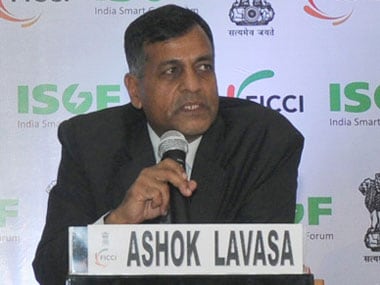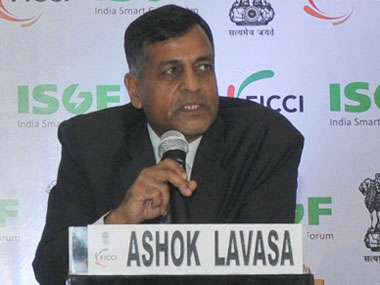One of the key members of the Election Commission, which is often perceived as a purposeful independent constitutional body, Election Commissioner Ashok Lavasa’s decision last week to recuse himself from meetings on poll code violations kicked up a storm at the fag end of the electoral process. According to media reports, he wrote a letter to Chief Election Commissioner (CEC) Sunil Arora, stating that he took the step as minority decisions in such cases were not being recorded. Lavasa’s letter is only the latest among a slew of controversies that the poll watchdog has had to deal with. However, it raises broad questions about the Model Code of Conduct and the procedure that the Election Commission adopts to deal with violations of these guidelines. [caption id=“attachment_1308371” align=“alignleft” width=“380”]  File image of Election Commissioner Ashok Lavasa. Image courtesy PIB[/caption] Arora’s initial response to the ongoing developments emphasised that the three members of the Election Commission are not expected to be “clones of each other.” While this statement is certainly correct, it misses the point. The reason for the ongoing fracas is not that there was dissent per se, but that the dissent was not recorded in the orders of the commission, as claimed by Lavasa. Central to the debate on whether minority decisions should be recorded is the question as to whether the poll panel’s decisions in such cases should be open to public scrutiny. The stand taken by the Election Commission is that cases related to violations of the Model Code of Conduct are executive, and not quasi-judicial in nature, and thus, the dissenting opinion does not need to be recorded in the final communiqué. The Election Commission (Conditions of Service of Election Commissioners and Transaction of Business) Act, 1991 merely states that in case of difference of opinion among the CEC and Election Commissioners, the opinion of the majority would prevail. However, the Act is silent on whether the minority opinion should be recorded. On this point, senior lawyer and former Maharashtra advocate general Srihari Aney said, “Such cases are not just administrative in nature, but are quasi-judicial proceedings. If there is a complaint about misconduct against a candidate running for the election – even if it is a frivolous one –the Election Commission takes a specific decision in this regard, one way or the other. The panel can issue directions for a host of measures, which can extend to disqualification of the candidate in question. Further, if the alleged misconduct, in any case, comes under the Representation of Peoples Act, 1951, the matter can be taken up in an election petition before a court after the polling process is over.” Aney further said, “There is nothing secret about it (decisions on Model Code of Conduct violations), and the verdict must be in the public domain. Also, after the passage of the Right to Information (RTI) Act, transparency is a feature that is statutorily encoded into the law, and would extend to all public bodies, including the Election Commission.” Lavasa has reportedly contended that the EC’s proceedings for deciding code of conduct violations are quasi-judicial, as the panel, like other semi-judicial bodies, follows principles of natural justice and allows the persons accused of violations to explain their stand. Indeed, the panel issues show-cause notices to candidates against whom there is a complaint, and the candidates file their replies in response to them, like in a court proceeding. Moreover, the Election Commission uploads various details about cases of Model Code of Conduct violations on its website – including the date of the occurrence, the person or party involved, the stage that the case is at present and the decision taken by the commission. This would appear to be an effort to uphold the principle that justice must not only be done but also be seen to be done. It stands to reason, then, that the reasons given for deciding on a complaint, whether unanimously, by the majority view, or the minority view, should also be made public. Senior lawyer Ashish Goel said, “The Election Commission’s rules require that all its decisions be unanimous in principle, and in case of dissent, the majority view should prevail. This is normal and is the case in all multi-member bodies. However, the convention has been to publish dissent. In the interest of transparency and public interest, given that the EC has a significant democratic role to play in ensuring free and fair elections, views of the dissenting member must be known not only to the complainant but also to the general public. Let people decide if there is any substance in the dissent. If the EC doesn’t disclose dissenting views, despite Lavasa asking for disclosure, then there seems to be an appearance of favouritism towards the ruling government, given that it is the government that will benefit from such non-disclosure.”
In a somewhat similar vein, former chief election commissioner SY Quraishi had opined on Twitter regarding the same case, “The dissenting note need not be included in the order but it should be a part of office proceedings. And (it should) be made public if the commissioner concerned wants it."
Moreover, as we see from court judgments, making dissenting opinions public only enriches public debate and discussion on crucial matters. For instance, Justice DY Chandrachud’s minority opinion on the legality of Aadhaar gives an important perspective on whether passing the Aadhaar Act as a Money Bill was justifiable. Similarly, Justice Indu Malhotra’s dissent in the Sabarimala matter made the case for why courts should not interfere in religious practices. These dissenting opinions neither lead to controversy nor lower the prestige of the Supreme Court in any way. Rather, they served to underline that the top court reflects democratic values, and acknowledges a plurality of viewpoints. There is no reason why it should be any different for the Election Commission. Transparency need of the hour The ongoing controversy over Lavasa’s minority opinion is a reflection of a broader issue of the need for transparency within key democratic institutions. Several aspects of the functioning of the government continue to be shrouded in largely unwarranted secrecy. A case in point is the system of allocating cases to judges, in which the Chief Justice acts as the Master of the Roster. As the allocation of cases is a matter left to the Chief Justice to decide individually, it leaves the field open for arbitrariness, and therefore, avoidable speculation. This issue came to light in unprecedented circumstances in January last year, when four sitting judges of the Supreme Court held a press conference to highlight that the apex court’s administration was, according to them, “not in order.” Even more worrisome was the case pertaining to the allegations of sexual harassment against Chief Justice of India Ranjan Gogoi. The complainant in the case stated that she was denied a lawyer, audio/visual recordings, copies of her statement and information about the procedure that the panel was following. She subsequently withdrew from the proceedings, and the in-house committee decided the case in her absence. On 6 May, the Supreme Court released a cryptic statement saying that the in-house committee “found no substance” in the charges made by the complainant, with no mention of how the panel arrived at the conclusion. As this article by Shishir Tripathi argues, the complainant may well be left no further legal recourse following the panel’s decision, and there is also a judicial precedent for keeping the report confidential. However, the office of the Chief Justice of India is a high constitutional post, and this is all the more reason why the Supreme Court must be seen to adhere to principles of natural justice. The apex court observed in the case of Indira Jaising vs Registrar General, Supreme Court of India and Anr that if a report of an in-house committee gets publicity, it will only “lead to more harm than good for the institution”. However, as recent events have served to highlight, opacity can cause more damage to the institution, leaving it open to speculation and insinuation. In April, lawyers Ashish Goel (quoted earlier in this article) and Gautam Bhatia wrote an open letter to the Bar Council of India, arguing, “Judicial independence does not imply freedom from accountability. The allegations of sexual harassment, made in a sworn affidavit with specific details, cannot be conveniently dismissed as being ‘wild’, ‘scandalous’, or politically motivated.” Speaking to Firstpost, Goel said, “I have always said it and I am of the firm belief that the report should have been made public. The rule of law requires it. Sunlight is the best disinfectant.” Incidentally, the phrase “sunlight is the best disinfectant” was used in a landmark recent judgment of the Supreme Court, which allowed the live-streaming of certain cases of constitutional importance. However, if recent events are anything to go by, many key aspects of government functioning are likely to remain deprived of the said “sunlight” for the time being.


)
)
)
)
)
)
)
)
)



